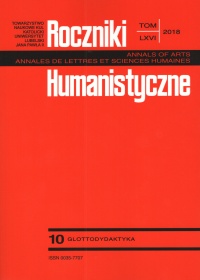Online Education in Polish Studies: Current State and Future Challenges (Based on Analysis of Selected Resources for Teaching Polish as a Foreign Language)
Abstract
For years one of the priorities has been the implementation of innovative technological solutions aimed at supporting and enhancing interest in language learning. Increasingly attention is drawn to the need for teaching programmes and methods to be modified to appeal to a new type of recipient, that called by Prensky native computer users. The paper consequently joins the ranks of those works that search for an answer to the question as to what extent the aforementioned postulates find realisation within the field of teaching Polish as a language.
The paper aims to present the Internet sources available which have been devised with foreigners learning Polish in mind as well as those individuals of Polish provenance living permanently abroad, this on the basis of developed sets of evaluation criteria. Given the extensive nature of the topic, attention has been paid only to those proposals (platforms, programmes, applications) which allow one to learn (also as self-study) and teach through the medium of distance learning. Presented against the background of those sources analyzed is the programme Po polsku po Polsce devised as an integrated cultural-language course of instruction for those at the level of A1.
References
Bax S., 2011, Normalisation Revisited: The Effective Use of Technology in Language Education, „International Journal of Computer-Assisted Language Learning and Teaching” I, Issue 2, s. 1-15.
Cwanek-Florek E., 2004, Komputerowe multimedialne interaktywne programy w rozwijaniu autonomii ucznia w nauczaniu języka niemieckiego – kryteria doboru, w: Autonomia ucznia w nauczaniu języków obcych – mity a rzeczywistość, red. M. Pawlak, Poznań–Kalisz, s. 258-264.
Dębski R., 2008, Od mediów przekazu do mediów uczestnictwa, Kraków.
Drzewińska A., 2008, Internetowe platformy edukacyjne a proces uczenia się i nauczania języka obcego, „E-mentor” nr 5 (27), http://www.e-mentor.edu.pl/mobi/artykul/index/numer/27/id/593
Elissavet G., Economides A. A., 2003, An Evaluation Instrument for Hypermedia Courseware, “Educational Technology & Society” VI, No 2, s. 31-44.
Gajek E., 2008, Edukacja językowa w społeczeństwie informacyjnym, Warszawa.
Gajek E., 2013, Technologie mobilne w edukacji językowej – na przykładzie języka angielskiego, „Meritum” Mazowiecki Kwartalnik Edukacyjny nr 4, s. 27-33.
Gajek E., 2014, Wikitekst o technologiach mobilnych w kształceniu nauczycieli języków obcych, „Języki obce w szkole” nr 2, s. 97-107.
Krajka, J., 2007, English Language Teaching in the Internet-Assisted Environment, Lublin.
Levy M., Stockwell G., 2006, CALL Dimensions: Options and Issues in Computer-Assisted Language Learning, Mahwah, NJ: Routledge.
Nastolatki wobec Internetu, 2014, Pedagogium WSNS na zlecenie Rzecznika Praw Dziecka i NASK, Warszawa.
Prensky M., 2001, Digital natives, digital immigrants „On the Horizon” IX, No 5, s. 1-6.
Rabiej A., 2015, Nowa krajowa polityka edukacyjna wobec Polonii, „Poradnik Językowy” nr 8, s. 112-131.
Silius K., Tervakari A. M., Pohjolainen S., 2003, A multidisciplinary tool for the usability, accessibility and informational quality of Web-based courses, http://matwww.ee.tut.fi/arvo/liitteet/PEG2003.pdf
Tergan S-O, 1998., Checklist for the Evaluation of Educational Software: Critical Review and Prospects, “Innovations in Education & Training International” 35, Issue 1, s. 9-20.
Twardoń M., 2011, Multimedia na lekcji języka obcego. Przykład wykorzystania programów narzędziowych do tworzenia interaktywnych i multimedialnych pomocy do nauki języków obcych, w: Wykorzystanie nowych technologii w dydaktyce języków obcych, red. M. Pawlak, B. Wolski, Poznań–Kalisz–Konin, s. 47-64.
Wazel G., 2001, Interkulturelle Kommunikation in Wirtschaft und Fremdsprachenunterricht (Deutsch als Fremdsprache in der Diskussion), Frankfurt a. M–New York: Peter Lang GmbH, Internationaler Verlag der Wissenschaften.
Copyright (c) 2018 Roczniki Humanistyczne

This work is licensed under a Creative Commons Attribution-NonCommercial-NoDerivatives 4.0 International License.





